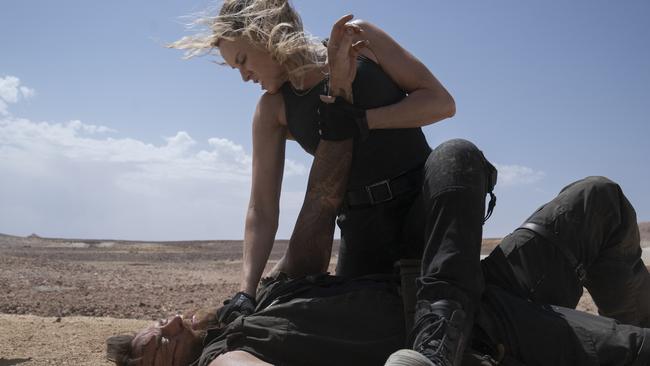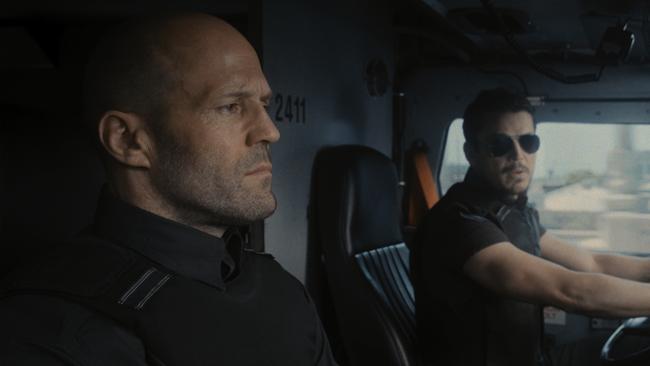
Oddly enough, it was the Oscars that persuaded me to see Mortal Kombat. Looking for something to watch on the eve of the Academy Awards, I noticed that the most screened movie in Sydney cinemas was not an Oscar contender but this martial arts fantasy thriller based on a video game.
I went to see the superb Judas and the Black Messiah, for which Daniel Kaluuya deservedly did win an Oscar the next day, but I made a note to read up on this movie I didn’t know much about and assumed, wrongly, was just for gamers.
When the box office numbers came in for that weekend, it was Mortal Kombat that, true to its genre, kicked arse. This 110-minute movie reboots its American-made mid-90s predecessors Mortal Kombat and Mortal Kombat: Annihilation (the video game came out in 1992).
When I read that the film was shot in South Australia, had an Australian director (Simon McQuoid in his feature debut), an Australian producer (James Wan of the Saw and Insidious horror franchises) and Australian cast members, I was hooked.
I’m glad I was, as this is not the movie I thought it would be.
Yes, it is violent, but it is clever, emotional, well-acted, well-scripted, well-filmed and, above all, very, very funny. It has authentic characters and tells a fully realised story, like a “proper” film is supposed to do. In short, it does not feel like a video game.
And if there was an Oscar for being funny, then Brisbane actor Josh Lawson would win for his performance as Kano, an Australian mercenary, hit man, arms dealer and all-round “scum of the earth”. He is so angry-funny, like an aggro Energiser Bunny, and his Australian accent so spectacularly broad (“Ya don’t have the mongrel in ya”) that I am confident there are moments where his co-stars laugh off-script.
As it happens Lawson, who directed and starred in the 2014 Australian sex comedy The Little Death, has been nominated for an Oscar, for his live action short The Eleven O’Clock in 2018. He is the must-watch star of this movie and I will look out for whatever he does next.
The action opens in 17th century Japan. A gang of Chinese-speaking toughs attack the home of a noted warrior, Hanzo Hasashi (Hiroyuki Sanada). His wife, young son and baby daughter are there. He fights back but it ends badly.
The main baddie, who can conjure sharp shards of ice, is someone we will come to know as Sub-Zero (Indonesian actor and judo expert Joe Taslim). A warning for the squeamish: this is the pre-titles sequence and there’s enough blood spilled to fill a swimming pool.
We then move to Chicago, now or some time in the future, and meet Cole Young (Chinese-British actor Lewis Tan), a mixed martial arts fighter who is down on his luck and fights for $200 a night. Australia’s David Field has a perfectly cast cameo as the fight promoter.
Cole has a wife and teenage daughter. He also has a dragon tattoo – or perhaps birthmark – that means, as he will soon find out, that he is one of the handful of fighters marked to protect earth from Outworld, the unearthly place that is Sub-Zero’s hood. The link back to 17th-century Japan is pivotal.
It’s a former US special forces officer, Sonya Blade (the excellent Jessie McNamee from Home and Away and Packed to the Rafters), who persuades Cole to join the fight. Kano, who also has the dragon mark, tags along when he’s offered a couple of million in cash.
Ms Blade, or “Blondie” in Kano’s worldview, uses a drawing board to explain that Outworld has won the past nine Mortal Kombat tournaments and if it wins a tenth, earthlings will be enslaved forever.
Cole points to the whiteboard and says, in a moment that tells us this film doesn’t take itself too seriously, “It sounds like you made that up, and look, you spelled it wrong”. Kano, sucking on a tinnie, tells her, “By the way, your beer’s shit and you’re almost out of it”.
Cole and Kano are taken to meet two fully-fledged warriors, ones who have unlocked their “arcana” aka superpower. One looks like a monk and one wears a “frisbee hat”, as Kano puts it. The extended scene where he faces off with them is hilarious. “I’m wanted in over 35 countries for shit you f...ing ballerinas couldn’t even imagine.” He’s right about that but wrong about them. That frisbee hat is central to a scene that has James Wan and Saw written all over it.
The Outworld assassins, who include Goro, a four-armed giant that any viewer will want to see in battle, come to earth to kill the dragon tattooed would-be saviours.
The plan is to eliminate the need for a tenth Mortal Kombat contest. “We didn’t win nine straight tournaments by following the rules,’’ their leader notes.
This movie does not follow the rules either. On one level it does what it’s supposed to do: show stunning fight scenes (the crew list includes 44 stunt people).
For this viewer it’s also a welcome reminder that sometimes, in films, books, other art forms and life in general, you can find unexpected pleasures in places you didn’t intend to visit.
The ending sets up a sequel, and this time I won’t need to be persuaded to see it.
-
Wrath of Man (MA15+)
In cinemas
★★½
The action thriller Wrath of Man is Guy Ritchie’s fourth collaboration with Jason Statham, following Lock Stock & Two Smoking Barrels (1998), Snatch (2000) and Revolver (2005). It is not as good as those films, and it’s leagues below the director’s previous one, The Gentlemen (2019), which I think should have earned Hugh Grant an Oscar nomination.
It’s not as good because of the script, which is a bit surprising as Ritchie co-wrote it with the same duo from The Gentleman, Ivan Atkinson and Marn Davies, and that is a four-star film.
The mediocre script feeds into the character development and the plot, each of which fall short. It’s tempting to say this is not a Guy Ritchie film, except that it is, with its interest in crime and especially with its retelling of a single scene from the perspective of different characters: in this case the armed holdup that starts the movie. The English director shares this interest in short-haul time travel with his compatriot Christoper Nolan.
That hold up, of an armoured car in Los Angeles, is what brings Harry Hill (Statham) front and centre. He is there, buying a burrito at a roadside stand, and something happens that marks his life forever.

We move forward and he has joined the same armoured car firm, one that moves $15m in cash per day. This movie is a remake of the 2004 French original Le Convoyeur, which was titled Cash Truck on its English release.
The firm is a blokey place that uses nicknames and Harry Hill is dubbed H, “like the bomb” or like Jesus H. Christ. This is a clever nod to the title, which comes from the Bible: “For the wrath of man worketh not in the righteousness of God.”
Yes, something unforgivable has happened to H and he is full of wrath. Yet is what he does with this wrath right? And was his involvement in that first holdup more than incidental? These are questions for viewers to work through.
This opening half of the two-hour film is where it’s at its best. The behind-the-scenes look at what it’s like to work for an armoured car firm is engrossing. The musical score, composed by Oscar winner Christopher Benstead, is strong from start to finish.
The dialogue is sharp and funny. None of the Americans want to work with ‘‘the Limey”, until he shows them what he can do when a holdup is attempted. He deadpans to his tough-until-he’s-panicked offsider Boy Sweat Dave (Josh Hartnett), “Dave, you just worry about putting your arsehole back in your arsehole and leave this to me.” I laughed out loud at that, but perhaps you had to be there.
This is one of the moments that tells us H is more than he seems. We learn more as the plot shifts back and forth in time. H is looking for someone who was involved in that first holdup and he will do whatever it takes to find him.
There’s an opportunity here to flesh out the character, to make us like him or dislike him, to understand him or not, but it’s not taken and the plot becomes shoot-’em-up predictable and the dialogue loses all of its charm and wit. There is far less of the hard-edged flair of Ritchie’s best films.
All of this is not helped by Statham’s stony-faced performance, which I assume is supposed to fit the character. Even so, he is no Hugh Grant, no Matthew McConaughey or Charlie Hunnam (co-stars in The Gentleman) and no Brad Pitt (Snatch).
The other actors do not have a lot to work with. Scott Eastwood, as one of the baddies (in a movie where perhaps everyone is a baddie) is the spitting image of his father, which is interesting to watch, almost external to the movie itself. Andy Garcia has a cameo to forget.
At one of the security guards (Irish actor Niamh Algar, one of two women in the movie), says of her colleagues, “We’re all over-qualified and we all have history.” That may be true, but we don’t get to see it.




Mortal Kombat (R18+)
In cinemas
★★★½